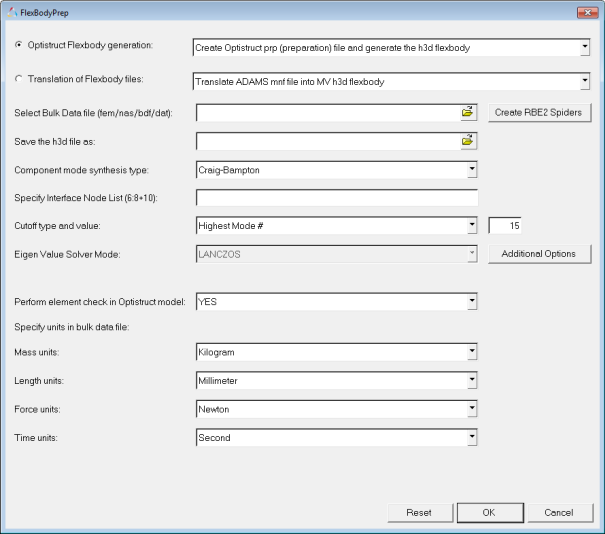FlexBodyPrep Overview |

|

|

|

|
|
FlexBodyPrep Overview |

|

|

|

|
The FlexBody Prep wizard allows you to create the flex H3D file from several sources, including an ADAMS MNF file, a NASTRAN PCH file, and a mirrored H3D file. You can also generate an H3D file using OptiStruct, a finite element analysis solver.
Using OptiStruct enables you to obtain stress modes in the flexbody H3D file. This allows stress recovery during the post-processing phase of an ADAMS run that was made based on an H3D file created by OptiStruct. The stress recovery is based on the component mode synthesis similar to displacement, but is generally more sensitive to the modes that are included in the simulation.
| Note | Use _flex.h3d in the filename to prevent confusion with other uses of the H3D format. Some options require OptiStruct to be in the user’s path. |
Space in the .fem and .h3d file paths is currently not supported on Linux and Mac OSX.
From the FlexTools menu, select Flex Prep to access the FlexBodyPrep wizard.

FlexBodyPrep wizard
FlexBodyPrep can be used to drive the flexprep utility for H3D neutral file generation as well as specific solver flexbody matrix files.
From the FlexBodyPrep wizard, you can perform the following functions:
OptiStruct Flexbody Generation
| • | Create OptiStruct prp (preparation) file and generate the h3d flexbody |
| • | Create OptiStruct prp (preparation) file |
| • | Create h3d flexbody using pre-existing prp (preparation) file |
| • | Translate ADAMS mnf file into MV h3d flexbody |
| • | Mirror existing h3d flexbody |
| • | Translate the MV h3d flexbody into ADAMS mnf file |
| • | Translate MV h3d flexbody into ADAMS mtx file |
| • | Translate the NASTRAN pch file into MV h3d file |
| • | Translate the MV h3d flexbody into DAD fdf file |
The dialog options change depending on the translation type you select.
Common dialog buttons include:
Mass/Length/ |
Specify the units for the output file. |
||
Clear |
Clear your selections and reset the wizard. |
||
OK |
After making your selections, click OK to have the wizard create your file. OK assembles your wizard selections into set of command line arguments for flexprep and invokes flexprep. To run flexprep from command line:
|
||
Cancel |
Exit the FlexBodyPrep wizard. |
See Also: